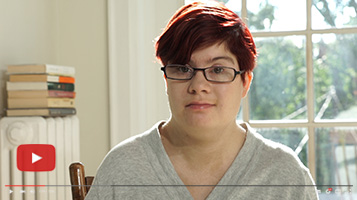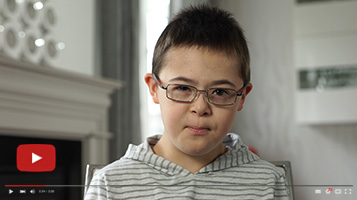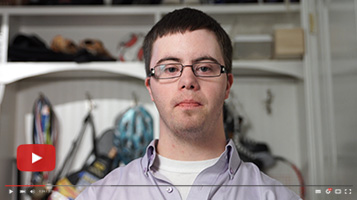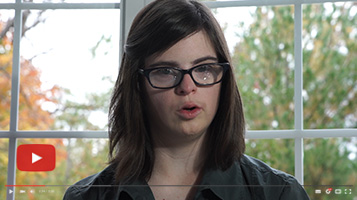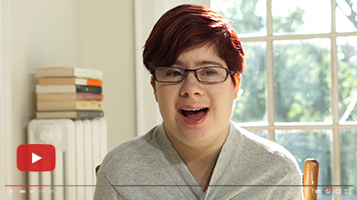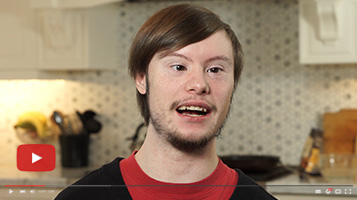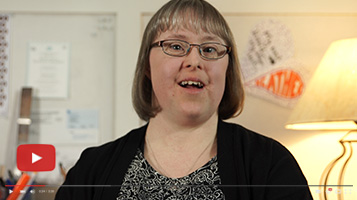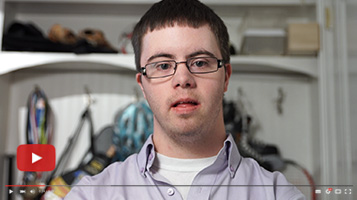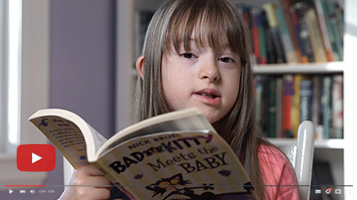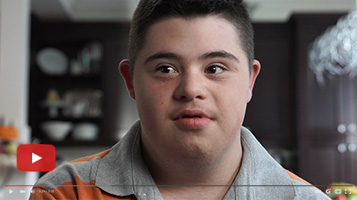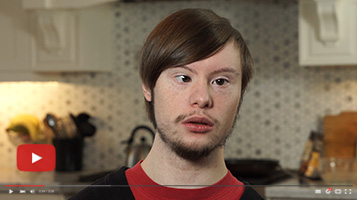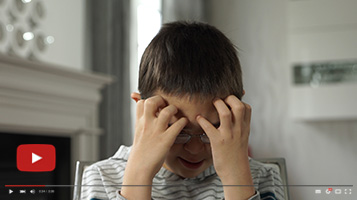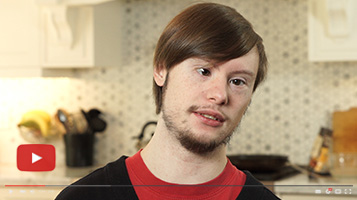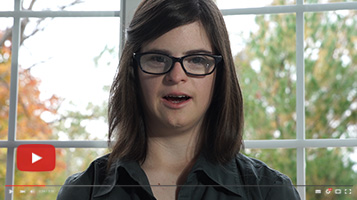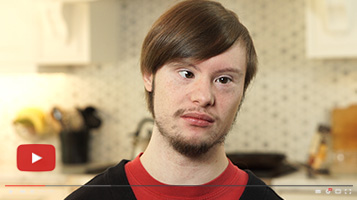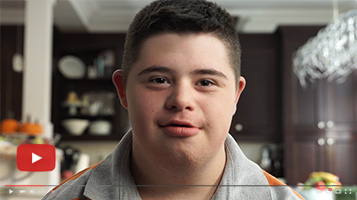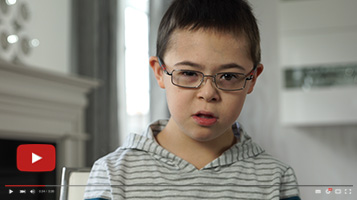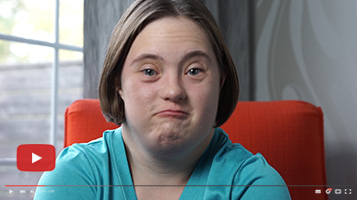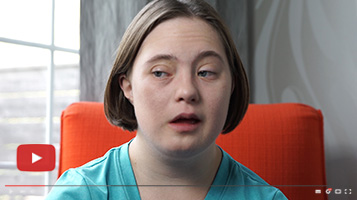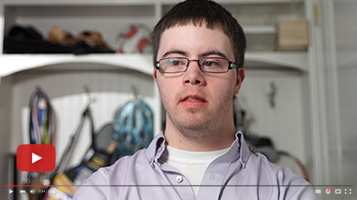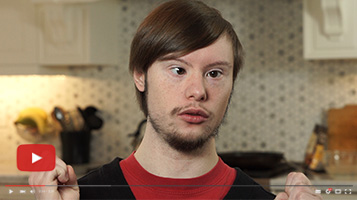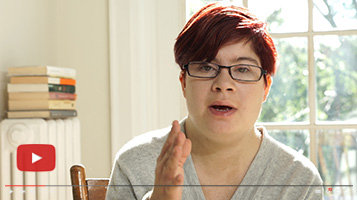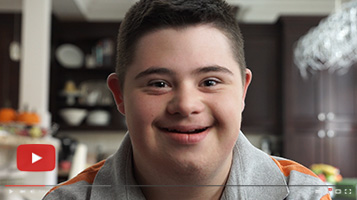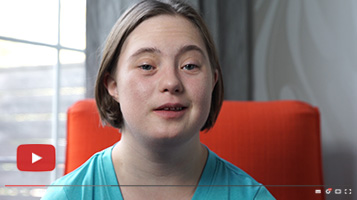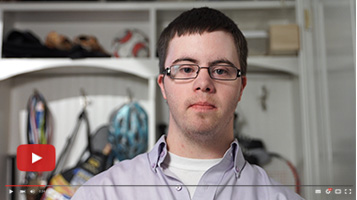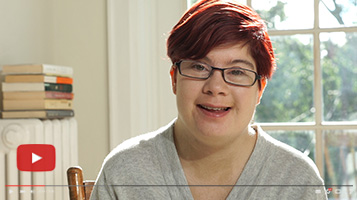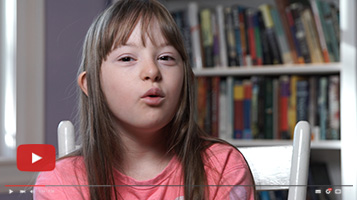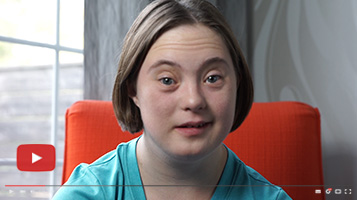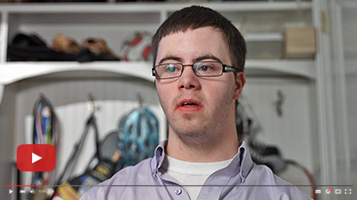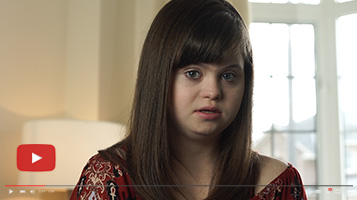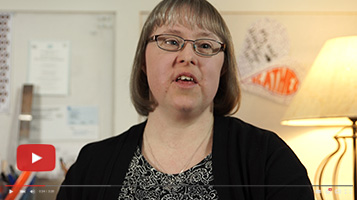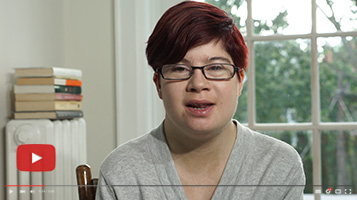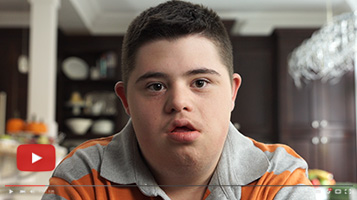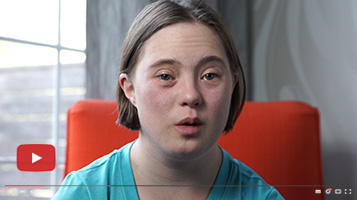Down Syndrome Answers
The best people to answer questions about Down syndrome are people with Down syndrome. We found the most-asked questions on Google and asked 10 Canadians with Down syndrome to give their answers.
What is Down Syndrome?
Down syndrome is a naturally occurring chromosomal arrangement in which a person has an extra copy of chromosome 21.
Down syndrome is a naturally occurring chromosomal arrangement that has always been a part of the human condition. The sole characteristic shared by all people with Down syndrome is the presence of extra genetic material associated with the 21st chromosome. This happens because of an error during cell division when the egg and sperm first meet. The effects of that extra genetic material vary greatly from individual to individual.
Can a person with Down syndrome ride a bike?
Like anyone else, a person affected by Down syndrome is able, with a bit of practice, to ride a bicycle.
With practice and help, people with Down syndrome are able to do many of the things that all people are able to do. This includes riding a bike. There are also modified bicycles available for people with mobility issues, which can include people with Down syndrome.
Can a person with Down syndrome get their driver’s licence?
Like anyone else, if a person with Down syndrome is able to pass the written and practical tests, they are allowed to drive.
With practice and help, people with Down syndrome are able to do many of the things that all people are able to do. This includes driving a vehicle. Some people with Down syndrome have their learner’s permits.
Can a person with Down syndrome live on their own?
Many adults living with Down syndrome are able to live on their own or with a roommate just like anyone else.
Independence can be an important issue for people with Down syndrome as they get older. Often, people with Down syndrome can live on their own or with a supportive roommate; there is a wide spectrum, from no support, to support once a week, to full-time support. There are services in place to help families with this transition as well. Contact your local group for more information.
Learn more about Paul Sawka, who is an example of this kind of situation. He has lived on his own since he was 26 years old with a supportive roommate.
Can a person with Down syndrome get married?
Everyone deserves to be loved. As long as a person with Down syndrome decides they found their significant other, they can get married just like anyone else.
There are people with Down syndrome getting married – to each other and people who don’t have Down syndrome – around Canada and the world.
Can a person with Down syndrome make their own meals?
Anybody can cook! And just like everyone else, many people with Down syndrome are more than able to prepare their own meals and feed themselves.
With practice and help, people with Down syndrome are able to do many of the things that all people are able to do. This includes cooking. Some people with Down syndrome may learn this skill in school, like other students in Home Economics or cooking classes.
Is Down syndrome a disorder?
Down syndrome is not a disorder, it is a naturally occurring condition, which impacts the arrangement in a person’s chromosomes.
Down syndrome is not a disease, disorder, defect or medical condition and therefore does not require treatment, prevention or a cure. It is inappropriate and offensive to refer to people with Down syndrome as “afflicted with” or “suffering from” it. People with Down syndrome can go to speech or motor therapy, but this does not treat Down syndrome itself.
Down syndrome is a naturally occurring chromosomal arrangement that has always been a part of the human condition. The sole characteristic shared by all people with Down syndrome is the presence of extra genetic material associated with the 21st chromosome. This happens because of an error during cell division when the egg and sperm first meet. The effects of that extra genetic material vary greatly from individual to individual.
Can a person with Down syndrome have a job?
Many adults who have Down syndrome are able to succeed at a job. Like anyone else, it is important to enjoy what you do to do it well.
Inclusive employment is an important mandate for the Canadian Down Syndrome Society. This is when people with disabilities are given fair and equitable access to decent, meaningful work, fair pay and working conditions, and opportunities for social inclusion. When people with Down syndrome are included in all aspects of society, including the workforce, society thrives. There is also strong evidence that when people with disabilities are employed and supported in their work, business thrives.
Can a person with Down syndrome learn to read?
Many people with Down syndrome have the capability to read and learn to read just like any other child when they begin school.
All people with Down syndrome learn, develop and achieve. People with Down syndrome have developmental differences that affect their learning style. It is important to identify the best methods of teaching each child. Ideally, through early intervention programs, this begins soon after birth.
The Canadian Down Syndrome Society has several Down syndrome resources for teachers and schools to enable them to provide the best possible education for children with Down syndrome and their peers.
When do babies with Down syndrome learn to talk?
Babies with Down syndrome may take a little longer to talk, or require help from a speech pathologist to help them speak clearly.
Speech-Language Pathology is among several supports available for a person with Down syndrome. There is no specific age when any child learns to talk.
CDSS encourages early intermission with different supports, such as speech-language pathology.
What health problems do people with Down syndrome have?
Some of the major health concerns people with Down syndrome may face are an increase in heart problems, thyroid concerns, and sleep apnea.
People with Down syndrome may face unique health complications beyond typical illnesses. Problems such as some congenital malformations of the heart can be life-threatening (although they can be surgically repaired), whereas other conditions are not as serious. No individual with Down syndrome will have all these potential health complications, however, every child needs good preventative medical care. Teamwork between the family and doctors is vital to anticipate potential problems, and provide specific and individual treatment throughout their life, should they occur. Appropriate health care can greatly enhance the potential and life of individuals with Down syndrome.
Which chromosome carries Down syndrome?
Scientists have identified chromosome number twenty-one to be the cause of Down syndrome. The condition is known as Trisomy 21.
There are 3 types of Down syndrome Trisomy 21, Translocation and Mosaicism.
Trisomy 21 – 95% of people with Down syndrome have Trisomy 21, three copies of chromosome 21, instead of two, which occurs during cell division
Translocation – 2-3% of people with Down syndrome have a translocation pattern, Part of chromosome 21 breams off and attaches itself to another chromosome (often the chromosome 14), Two-thirds of translocation occurrences are spontaneous while the other third is inherited from a parent
Mosaicism – 2% of people with Down syndrome have Mosaic Down syndrome, Cell division occurs in one of the early cell divisions after conception, resulting in some cells having three copies of chromosome 21 instead of two, Like their peers, a person with Down syndrome has diverse abilities. An individual’s level of functioning is not dependent upon the determination of one of these types of Down syndrome.
Which parent does Down syndrome come from?
Science has shown inconclusively that Down syndrome could occur from either side of a child’s birthparent’s gene pool.
Some studies have shown that maternal age is a factor in the likelihood of having a child with Down syndrome, especially after the age of 35. However, new studies have shown that paternal age can also be a factor.
That said, most children with Down syndrome are born to women younger than 35.
How does Down syndrome affect the body?
Down syndrome may cause low muscle tone, potential heart complications, and vision issues.
The sole characteristic shared by all persons with Down syndrome is the presence of extra genetic material associated with the 21st chromosome. The effects of that extra genetic material vary greatly from individual to individual. Persons with Down syndrome may be predisposed to certain illnesses and medical conditions that are also present in the general population.
Down syndrome, in and of itself, is not a medical condition and therefore should not prohibit a successful application for or access to medical services, insurance and treatments.
What causes Down syndrome?
Scientists have identified an extra copy of chromosome number twenty-one to be the cause of down syndrome.
There are 3 types of Down syndrome Trisomy 21, Translocation and Mosaicism.
Trisomy 21 – 95% of people with Down syndrome have Trisomy 21, Three copies of chromosome 21, instead of two, which occurs during cell division
Translocation – 2-3% of people with Down syndrome have a translocation pattern, Part of chromosome 21 breams off and attaches itself to another chromosome (often the chromosome 14), Two-thirds of translocation occurrences are spontaneous while the other third is inherited from a parent
Mosaicism – 2% of people with Down syndrome have Mosaic Down syndrome, Cell division occurs in one of the early cell divisions after conception, resulting in some cells having three copies of chromosome 21 instead of two, Like their peers, a person with Down syndrome has diverse abilities. An individual’s level of functioning is not dependent upon the determination of one of these types of Down syndrome.
What does Down syndrome look like?
People with Down syndrome may have particular physical features that may be different from an average person, but it never stops them from enjoying life.
There are a list of physical traits that are often found in people with Down syndrome – Small, flat nose, Almond-shaped eyes that have an upward slant, Smaller limbs and body frame, A gap between the first and second toes that is larger than that of a typically developed individual, Low muscle tone, Single deep crease across the palm of the hand – but these aren’t always found in every person with Down syndrome.
People with Down syndrome look like members of their family, like all people.
What does Down syndrome affect?
A person with Down syndrome may be a little bit slower when it comes to learning, but with a positive attitude and focus it can be overcome.
All people with Down syndrome learn, develop and achieve. People with Down syndrome have developmental differences that affect their learning style. It is important to identify the best methods of teaching each child. Ideally, through early intervention programs, this begins soon after birth.
The Canadian Down Syndrome Society has several Down syndrome resources for teachers and schools to enable them to provide the best possible education for children with Down syndrome and their peers.
Who gets Down syndrome?
Down syndrome does not discriminate, any one child within seven hundred and eighty one may be born with down syndrome.
Down syndrome is a naturally occurring chromosomal arrangement that has always been a part of the human condition. The occurrence of Down syndrome is universal across racial and gender lines, and it is estimated to be present in approximately one in 781 births in Canada.
Down syndrome is not a disease, disorder, defect or medical condition. It is inappropriate and offensive to refer to people with Down syndrome as “afflicted with” or “suffering from” it. Down syndrome itself does not require either treatment or prevention.
Why is Down syndrome called Down syndrome?
Doctor John Langdon down discovered common traits of people with Trisomy 21 and later the it was named after him.
Down syndrome is named after John Langdon Down, a doctor who first identified Down syndrome. He didn’t have Down syndrome, so it is not possessive (as in Down’s). Some countries still refer to “Down’s syndrome”, but in North America, we do not.
Is Down syndrome inherited?
Down syndrome is not gereditary, it i a randomly occuring condition which affects on in seven hundred and eighty one.
There are three types of Down syndrome Trisomy 21, Translocation and Mosaicism. Of the three, translocation can be inherited. However, Translocation Down syndrome appears in just 2-3% of people who have Down syndrome, and just one third of those people inherit it.
In Canada, approximately 1 in every 781 live births results in a Down syndrome determination.
How does Down syndrome affect intellectual development?
A person with Down syndrome may need a little extra help to learn things, or require teaching methods different from someone without it.
All people with Down syndrome learn, develop and achieve. People with Down syndrome have developmental differences that affect their learning style. It is important to identify the best methods of teaching each child. Ideally, through early intervention programs, this begins soon after birth.
The Canadian Down Syndrome Society has several Down syndrome resources for teachers and schools to enable them to provide the best possible education for children with Down syndrome and their peers.
How does a child with Down syndrome affect the family?
Having a child with Down syndrome is much like having any child. Children with Down syndrome are just like any other child and deserve support from their family.
Having a child with Down syndrome will affect everyone in your family: parents, siblings, grandparents, and extended family. We encourage you to download 21 Welcomes, which includes 21 stories from self-advocates, parents, siblings, and grandparents about what it was like to welcome a baby with Down syndrome into their families.
As reported in the American Journal of Medical Genetics Part A, researchers found that in 87 percent of families they surveyed, everyone – parents and siblings – said they loved their family member who had Down syndrome, and almost as many families said they felt pride for the child.
There may be some added stress because of therapies and health concerns but all provinces in Canada offer support to families for this.
How is Down syndrome screening done?
Scientists have not yet been able to create a test with 100% accuracy pertaining to the screening of Down syndrome as it occurs randomly.
There is a blood test available to screen for sensitivity to Down syndrome in a fetus. CDSS advocates for fair and balanced information about Down syndrome from doctors when giving a Down syndrome diagnosis. No test can truly be 100% accurate. Too often, claimed accuracy for sensitivity and specificity (99%) is confused for positive predictive value.
Is there treatment for Down syndrome?
Treatment is not the right word. There are programs and therapies available for children with Down syndrome to assist them with their speech, learning, and motor skills.
People with Down syndrome may have extra needs. The majority of professionals are involved in their lives from birth. It is important to know about the support a student requires. Professionals that may be involved in the student’s everyday life include: Occupational Therapist, Physical Therapist, Speech-Language Pathologist, and/or Social Worker.
Can a person with Down syndrome go to college?
Colleges & Universities don’t discriminate, if someone is able to attend college and get good grades they can study anything they want.
There are many universities and colleges that have programs for people with Down syndrome to gain life skills and take classes with their typical peer group. Most of the time, these programs are called Inclusive Post-Secondary Education Programs.
Is Down syndrome the same as autism?
No, Down syndrome and autism are entirely different. And just like anyone else the chances of developing autism are the same.
There are resources available for people who have this dual diagnosis available at Down Syndrome Resource Foundation
Are people with Down syndrome always happy?
Just like for anyone else, life has happy moments, and not-so-happy moments. People with Down syndrome deal with emotions just like anyone else.
People with Down syndrome are not all alike. A popular generalization is associating people with Down syndrome as always loving, smiling, or happy. Just like the general population, people with Down syndrome experience a full range of emotions.
Are babies with Down syndrome bigger?
Babies born with Down syndrome are no larger, or smaller, than any other child.
The size of a baby with Down syndrome is not any different than any other child. There are other factors that determine if a newborn has Down syndrome. If a baby is suspected to have Down syndrome, they are given a blood test to see the number of chromosomes in the cells.
A baby may be underweight due to feeding issues; if you are concerned, speak to your doctor.
What are the odds of Down syndrome?
The statistical odds of an occurrence of Down syndrome is 1 in seven hundred and eighty one births.
In Canada, approximately 1 in every 781 live births results in a baby with Down syndrome. It is one of the most common developmental disabilities.
Can people with Down syndrome play sports?
As long as they are physically capable, a person with Down syndrome can play any sport they want.
People with Down syndrome are often encouraged to participate in sports at a young age, to help build muscle tone, which can be naturally lower in people with Down syndrome. There are many avenues for people with Down syndrome to participate in physical activities – from organized sports through local sports teams to Special Olympics. It should be noted that children with Down syndrome should be checked for atlanto-axial instability and get their doctors approval for playing some sports such as gymnastics, contact sports etc.
Is Down syndrome curable?
Down syndrome is a random occurrence in nature. It has no cure or prevention measures.
Down syndrome is not a disease, disorder, defect or medical condition and therefore does not require treatment, prevention or a cure. It is inappropriate and offensive to refer to people with Down syndrome as “afflicted with” or “suffering from” it. People with Down syndrome can go to speech or motor therapy, but this does not treat Down syndrome itself.
Down syndrome is a naturally occurring chromosomal arrangement that has always been a part of the human condition. The sole characteristic shared by all people with Down syndrome is the presence of extra genetic material associated with the 21st chromosome. This happens because of an error during cell division when the egg and sperm first meet. The effects of that extra genetic material vary greatly from individual to individual.
How long does a person with Down syndrome live?
Today, a baby born with Down syndrome may have a life expectancy of over sixty years, but as with anyone else there is no definitive number.
The life expectancy of a person with Down syndrome continues to grow due to increases in services and supports available. Quality of life is a significant factor for this community; many people with Down syndrome are living beyond 60 years old.
Can people with Down syndrome have a baby?
Women with Down syndrome are able to have children, but many men with the condition unfortunately are not able to, however it is possible.
Women who have Down syndrome are able to have children; they have a 35-50% chance that their baby will have Down syndrome. Some males with Down syndrome are unable to, but should contact their doctor to find out. Read Swimmers in the Family Stories section to read about one family’s experience. There have not been many studies regarding males with Down syndrome and sexuality.
Which trisomy is Down syndrome?
This question is a misnomer, “trisomy” just means three chromosomes. Down syndrome occurs when there is a trisomy of chromosome number 21.
There are 3 types of Down syndrome Trisomy 21, Translocation and Mosaicism.
Trisomy 21 – 95% of people with Down syndrome have Trisomy 21, three copies of chromosome 21, instead of two, which occurs during cell division
Translocation – 2-3% of people with Down syndrome have a translocation pattern, Part of chromosome 21 breams off and attaches itself to another chromosome (often the chromosome 14), Two-thirds of translocation occurrences are spontaneous while the other third is inherited from a parent
Mosaicism – 2% of people with Down syndrome have Mosaic Down syndrome, Cell division occurs in one of the early cell divisions after conception, resulting in some cells having three copies of chromosome 21 instead of two, Like their peers, a person with Down syndrome has diverse abilities. An individual’s level of functioning is not dependent upon the determination of one of these types of Down syndrome.
What is trisomy 21?
Trisomy means three chromosomes, and twenty-one refers to the chromosome number, which has 3.
There are 3 types of Down syndrome Trisomy 21, Translocation and Mosaicism.
Trisomy 21 – 95% of people with Down syndrome have Trisomy 21, three copies of chromosome 21, instead of two, which occurs during cell division
Translocation – 2-3% of people with Down syndrome have a translocation pattern, Part of chromosome 21 breams off and attaches itself to another chromosome (often the chromosome 14), Two-thirds of translocation occurrences are spontaneous while the other third is inherited from a parent
Mosaicism – 2% of people with Down syndrome have Mosaic Down syndrome, Cell division occurs in one of the early cell divisions after conception, resulting in some cells having three copies of chromosome 21 instead of two, Like their peers, a person with Down syndrome has diverse abilities. An individual’s level of functioning is not dependent upon the determination of one of these types of Down syndrome.
Can’t find the answer to your question?
Please contact us and we’ll be happy to help!
Credits
We want to express our gratitude to the team at FCB Toronto and all those involved for their support and creativity behind ‘Down Syndrome Answers’.
Participants
Adam, Cameron, Caleigh, Dylan, Jan, Julia, Leah, Krystal, Travis, Valerie and their support, friends, and families.
Creative
Chief Creative Officer: Nancy Crimi-Lamanna/Jeff Hilts/ Jon Flannery
Art Director: Simon Tuplin
Writer: Peter Gardiner
Account Management
Group Account Director: Anabella Mandel
Account Executive: Joline Christiani
Agency Producer: Judy Hamilton
Strategy
Chief Strategy Officer/Sr. Planner: Shelley Brown
Sr. Strategist: Eryn LeMesurier
Digital Strategist: Shelagh Hartford
Production Credits
Production Company: Jigsaw Casting Shasta Lutz – Casting
Director: Elias Campbell
DOP: Stephen McLouglin
Editor: David Rodriquez
Other: Reprise Media Ryan Thomas
CDSS
National Executive Director: Kirk Crowther
Board Treasurer: Ed Casagrande
Board Member: Ben Tarr
Communications Manager: Kaitlyn Pecson
Awards
- 10 Cannes Lions at the Cannes Lions International Festival of Creativity – for excellence in Health, Direct, Cyber, Creative Data, PR and Media. Down Syndrome Answers become the most awarded Canadian campaign at Cannes.
- People’s Choice Winner of the Best Use of Data Driven Media from The Webby Awards
- Graphite Pencil for Tactical Digital Marketing from D&AD
- Silver Social Marketing award in Public Service from The ANDY Award
- Silver Pencil for Social Media & Viral Marketing and Craft, Data-Driven Personalization – Single or Campaign at The One Show
- Shortlisted at AToMiC Awards

